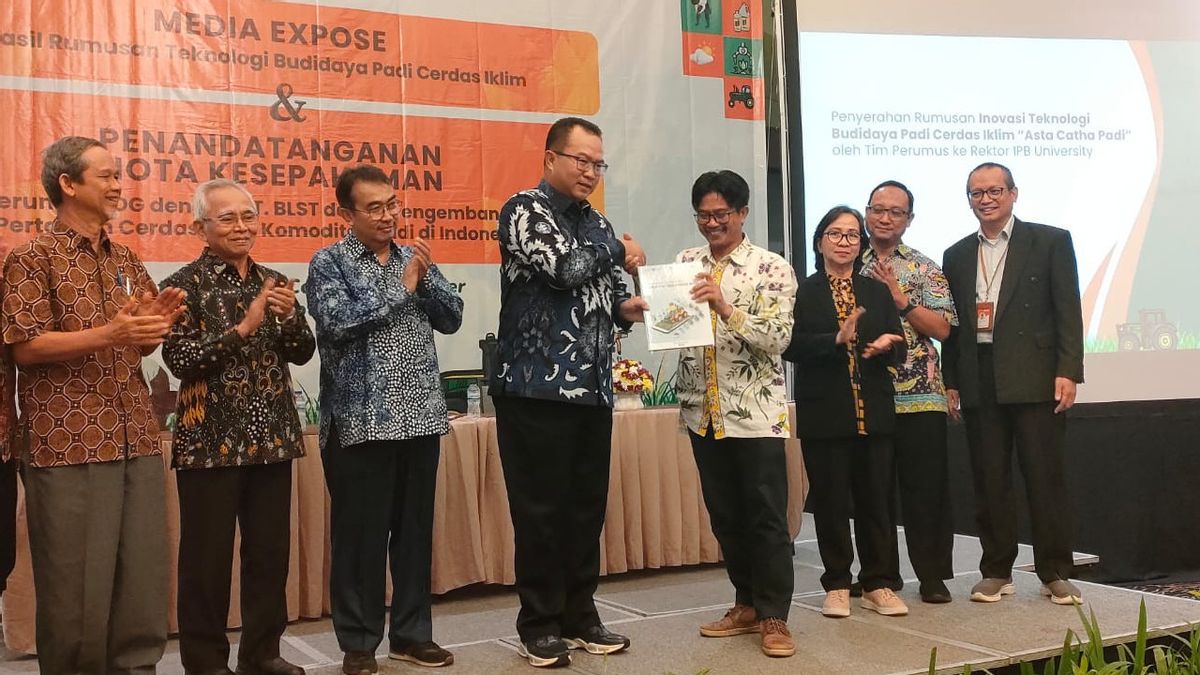BOGOR - The Public Company of the Logistics Affairs Agency (Bulog) collaborated with 12 researchers under PT BLST IPB University in formulating smart agriculture in the rice commodity climate in Indonesia called Asta Citha Padi.
This collaboration is to maintain and increase rice production in the face of global climate change which will have an impact on rice stocks.
Director of Supply Chain and Public Service of Perum Bulog Mukhamad Suyamto said that to maintain the rice supply which is Bulog's obligation at all times is 1.2 million tons, cooperation is needed with researchers and farmers.
"So far, we have tried various ways to increase production and maintain price stability in farmers and consumers. This formulation (IPB researchers) will have an impact on farmers' production that we need to improve," he said at the signing of Bulog's work with IPB at ICC Botani Square, Bogor, West Java, Tuesday, September 3.
According to Suyamto, it is necessary to facilitate superior rice seeds, capital for farmers by means of partnerships and fostering farmers to maintain Indonesia's rice and rice production, one of which is through Asta Cetha Padi in the future.
In principle, he said, Bulog wants to maintain the quality of rice supplied from producers, traded to consumer consumption.
"Because we are also tasked with maintaining the quality of rice, how when the stock remains of good quality and the stock is sufficient from producers to consumers," he explained.
IPB University Chancellor Professor Arif Satria is of the view that the formulation of climate smart rice in the face of climate change is very important to reduce rice imports and food lost rice which reaches 3-5 percent after harvest.
There have been nine IPB rice varieties launched by IPB able to adapt to climate change, namely IPB 3S, IPB 9G, IPB 10G, 1PB 11S, BEPE, IPB 12S, IPB 13S, IPB 14S and IPB 15 S. Overall, IPB is developing rice varieties up to 13 varieties.
With the formulation of climate smart rice through superior IPB varieties, it has an effective character in water utilization and saves up to 30 percent of fertilizer use.
"The application of superior varieties supported by the formulation of Asta Citha Padi can reduce 2.5 tons of food lost every harvest and will increase by 8 percent of production. This will reduce imports," he explained.
Dr Achmad Junaedi, chairman of the IPB University climate smart rice perumus team, explained that there are eight components of technological innovation that support the formulation, namely development of superior varieties, improvement systems, cultivation systems, management of nutrients, water management, upstream and downstream mechanisms, environmentally friendly PHT and supply chains and integrated campaigns.
The formulation system will be realized with Indonesia's climate smart rice cultivation technology platform.
"We have a call for Asta Citha Padi, namely H2E5I (Hey), there are two that must be, five are efficient and one is integrated. With this we can maintain and increase Indonesia's rice production to reduce import dependence," said Akhmad Junaedi.
The English, Chinese, Japanese, Arabic, and French versions are automatically generated by the AI. So there may still be inaccuracies in translating, please always see Indonesian as our main language. (system supported by DigitalSiber.id)













